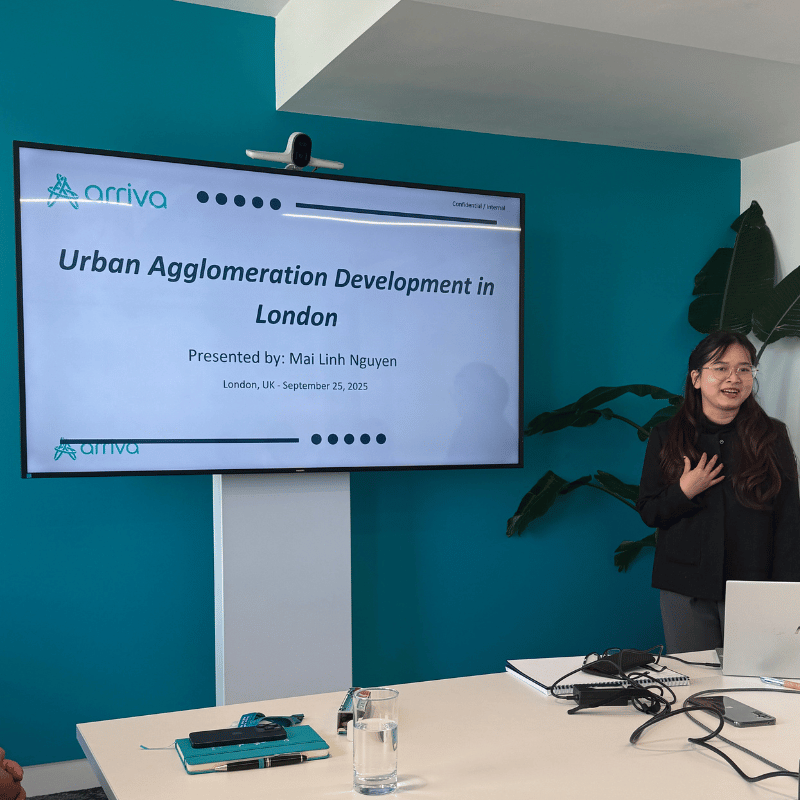Duration:
MSc September start: 1 year (full-time), or 2 years (part-time)
PGDip: 8 months (full-time)
PGCert: 4 months (full-time)
MSc January start: 15 months (full-time)
Please add an additional year if undertaking the Professional Experience Year: integrated 2-year masters.
Number of credits:
MSc: 180 credits at Level 7
PGDip: 120 credits at Level 7
PGCert: 60 credits at Level 7
Start date(s):
January 2026
April 2026
September 2026
Transitioning to a more sustainable way of life is key to our future. This MSc will provide you with the knowledge and skills to drive forward change in the management of global supply chains.
Did you know?
This programme is CIPS accredited, you'll be entitled to complimentary CIPS Affiliate membership
We're in the top ten in the UK for postgraduate satisfaction (PTES 2022, 2023)
This course is available as an extended masters for international students
These are the current planned modules on this course and may be subject to change.
These are the modules you will take if you join us from September 2026 onwards.
30 credits
This module aims to equip you with the knowledge and methods necessary to address pressing strategic, social and ethical challenges businesses face.
It provides a critical understanding of Corporate Strategy and Corporate Social Responsibility (CSR) in an international context. You will learn to apply strategic concepts and tools essential for managers in multinational firms, with a focus on sustainability practices influencing business policy and stakeholder relationships. Additionally, the module emphasises the importance of data-driven decision-making and non-market strategic management, preparing future professionals to navigate the complexities of modern business environments.
The module provides a number of essential frameworks to guide future managers in analysing the main factors relevant to the strategy-making process. These frameworks are designed to offer a structured approach to strategic analysis, ensuring that all critical aspects are considered. Real-world case studies and insights from leading corporations will be utilised to illustrate the practical application of the strategic frameworks.
All business operations transpire within a complex social landscape, and non-market aspects play a significant role in strategic management. This includes political, economic, and environmental issues that can impact organisational success. The module highlights the importance of understanding these non-market factors and incorporating them into strategic planning.
You will learn how to analyse and address social and ethical issues that businesses face today. This includes topics such as corporate governance, ethical leadership, and social justice. By understanding the broader impact of business decisions, you will be able to foster a more ethical and responsible business culture.
Teaching and learning
You will gain a comprehensive understanding of strategic decision-making and how to apply it within business contexts. Each week, you will participate in a carefully organised learning experience comprising of a one-hour lecture and a three-hour workshop.
Lectures will introduce and elaborate on key concepts and frameworks pertinent to strategic decision-making. These sessions are designed around the indicative course content, aiming to give you a solid theoretical foundation. The lecture topics will encompass a broad spectrum of examples and case-based learning drawn from business practices and societal contexts to demonstrate the practical applications of these concepts. This approach ensures that you can relate theoretical knowledge to real-world scenarios, thereby enhancing their comprehension and retention of the material.
Workshops will delve deeper into the theoretical approaches, exploring the detailed exploration of business cases. You will examine various scenarios that are likely to arise in organisational, management, and business situations.
You will engage with real-life case studies; where you will learn to navigate complex ethical issues and make informed decisions that are both strategic and responsible. You will explore global sustainability challenges and opportunities, learning how to drive innovation through sustainable practices and responsible leadership.
You will also have 30 minutes of online support, which will include resources such as articles, videos, interactive modules and quizzes.
Assessment
This module will be assessed using a group presentation and an individual case study.
50% - group presentation, where you will focus on a specific problem.
50% - individual case study report, where you will critically discuss and evaluate a company’s strategic sustainability issue(s).
30 credits
This module provides a critical understanding of how organisations design and manage end-to-end supply chain systems. You will analyse sourcing, inventory management, logistics, quality, and risk management, with emphasis on aligning supply chain strategies with organisational goals.
Case studies will demonstrate how firms integrate lean, agile, and hybrid approaches, balancing cost efficiency with resilience and sustainability. You will also assess how digital tools and globalisation influence supply chain decisions.
By the end of the module, you will be able to design, critique, and recommend strategies that improve performance across complex supply chain networks.
Teaching and learning
Weekly lectures and seminars integrate theory with applied case-based learning. You will explore practical supply chain challenges through simulations and industry data analysis.
Assessment
This module will be assessed by an individual report (70%) and a group presentation (30%).
30 credits
This module aims to give you an in depth understanding of the fundamental principles of contemporary supply chain sustainability, resilience and risk within a business context focusing on social, economic and environmental considerations and environmental policies.
It will help to understand how key stakeholders operate, regulate, decide and function in the real world. It will identify, prioritise, reflect and conceptualise green supply chain management / sustainable supply chain management together with risk and risk-resilience concepts in the context of business continuity against the key priorities of environment, economy, safety, public health, social inclusion, accessibility and integration.
The module explores the ways in which good practice in these fields underpinned with theoretical relevance can contribute to the optimisation of operational efficiency, manage waste streams, build in risk-resilience, socially just, transparent and accountable supply chain organisations and contribute towards the Circular Economy.
It also examines organisational excellence, how contemporary organisations mitigate/adapt to risk and can play a role in improving conditions such as public health, social justice and environmental risk and seek sustainable competitive advantage(s) for the fruition of broader ‘triple bottom line’ benefits.
Teaching and learning
The teaching delivery on this module consists of one hourly and one three hour workshop per week.
Lectures will cover key concepts, models, and theoretical frameworks in global supply chain management, using real-life examples to illustrate their practical applications. Guest lectures will also be incorporated to enrich the variety of learning methods and tools.
Seminars will focus on exploring the practical applications of theories and concepts through discussions of real-world industry case studies. Seminar activities will include small group discussions, debates, roleplays, and short group presentations.
Assessment
This module will be assessed by an individual report (70%) and a group presentation (30%).
30 credits
This module provides you with an introduction to the role of emerging digital technologies (such as big data analytics, artificial intelligence, Internet of Things, and blockchain) and analytics tools, techniques, and processes in global logistics and supply chain management.
You will gain an in-depth understanding of topics such as supply chain analytics, data analytics and transport planning, e-procurement, and lean and agile supply chains in the era of Industry 4.0. You will be equipped with in-depth practical knowledge of analytical tools and techniques that you will use in a career in logistics and supply chain management. You will also be able to provide innovative practical solutions for modern logistics and supply chain challenges with a global perspective.
This module enhances your critical thinking, analytical skills, and data-driven decision-making capabilities. By applying theoretical frameworks and concepts to real-world scenarios, you will gain practical expertise in digital logistics and supply chain management, equipping you for leadership roles across various industries.
The focus on critical evaluation ensures you understand both the benefits and challenges of digital transformation, fostering adaptability, agility, and resilience in the digital age and in times of uncertainty.
Teaching and learning
The delivery for this module consists of one, one-hour lecture and a three hour seminar each week.
Lectures will cover key concepts, models, and frameworks in digital logistics and supply chain management. In addition, guest lectures will be used to further expand the range of learning methods and tools.
Seminars will focus on specific theoretical approaches, exploring their potential applications through discussions of real-world industry case studies. Group discussions of these case studies will play a central role in the seminars.
Assessment
This module will be assessed by an individual report (70%) and a group presentation (30%).
60 credits
You will apply your knowledge to a real-world business setting.
You will choose from three career pathways:
- Consultancy challenge – collaborating with international businesses, NGOs, and community organisations, through a structured consultancy challenge, you will work in teams to tackle real-world business problems. This hands-on experience not only strengthens your professional skill set but also enhances your professional and social capital and competitiveness in the global marketplace.
- Research internship - as a research intern, you will undertake a small research project under the supervision of experienced researchers from our Centre for Sustainability and Responsible Management. You will experience projects that are beneficial for a wide range of stakeholders, including local and central governments, businesses and charitable organisations.
- Start-up pathway - if you're interested in becoming a entrepreneur, this pathway is specifically designed to support you with developing of a new venture idea.
These are the current planned modules on this course and may be subject to change.
Professional Experience Year
This course also offers the option of a Professional Experience Year. This programme combines dynamic career modules with flexible placement opportunities. After completing your first year of study, you'll then spend the next academic year completing your Professional Experience training as part of your degree. This will give you real career experience. This unique opportunity offers you distinct paths to build your expertise.
“I am truly grateful to both Arriva and Roehampton’s Business School for making this opportunity possible, as it has broadened my outlook, expanded my network, and motivated me to keep exploring how business and sustainability can contribute to building smarter, more inclusive transport solutions.”
Mai, MSc Global Logistics and Supply Chain Management on Arriva's Future Transport Workshop

Block Mode Teaching
From September 2025, this course will be taught in dedicated blocks.
This innovative approach means that you will be taught in six-week blocks that focus exclusively on one module at a time. You will be able to fully immerse yourself in each topic and apply your learning effectively.
Each module block includes eight teaching hours (lectures and practical workshops) each week, over two days.
- You can focus on one subject at a time, maximising your understanding, retention and application of knowledge
- Reduce the stress of juggling multiple subjects at once
- A clear timetable making it easier to balance academic commitments with personal life
- Dedicated days to delve into each topic without distraction
- Focus on one assessment at a time at the end of each block
- Eliminates the pressure of multiple end-of-term assessments
- Regular tasks are integrated into each block, ensuring timely feedback and continuous improvement
- A modern, practical way to learn that prepares you for your career goals.
Induction week – you will be introduced to the subject, the course team and other students on the module
Six weeks of teaching – deep dive into content led by subject experts, utilising research informed teaching, practical case studies, group work and hands-on projects
Assessment week – each block will end with a focused assessment where you can apply your knowledge to real-world cases
Break week - opportunity to prepare for your next block and connect with new students

Skills
Gain the expertise you need to upskill and specialise in your career.
Our MSc Global Logistics and Supply Chain Management will give you a great understanding of supply chains and their processes, including the different roles people play and how they work together to deliver products and services.
You'll explore:
- Accounting, budgets and other planning systems
- Decision-making and control
- How to apply appropriate analytical tools and techniques to optimise organisation performance
You'll also examine how sustainability practices and concepts influence international business policy, stakeholder relationships and strategy design and process.
Professional Development Programme
Through this mandatory, co-curricular module, you’ll practice and enhance your core skills in the following areas:
- Presenting
- Critical writing
- Research
You’ll also work on negotiation techniques, developing the credibility of your arguments to give you the competitive edge.
Professional placement
If you want to dip your toes into the working world before you graduate, you can take an optional placement in Year 2. Where possible, this will be tailored to your interests and career aspirations. And wherever your placement takes you, it will enable you to:
- Develop practical problem-solving skills in a professional context
- Apply learned concepts, and
- Gain a better understanding of your own employability
Professional accreditation
This programme is a CIPS accredited programme, you'll be entitled to complimentary CIPS affiliate membership.
A CIPS accredited programme also provides fast-track to MCIPS. To apply for MCIPS designation, you will need to submit your application to CIPS within five years of graduating and you must have three years experience within a role of responsibility within the procurement and supply sector.
Learning
Our MSc Global Logistics and Supply Chain Management degree will empower you to meet the needs of both multi-national corporations and SMEs.
Designed in collaboration with academic staff who have a wealth of experience in supply chains across different industries including maritime, food, health, manufacturing and service.
Working in high-spec facilities, like our Business Laboratory and Bloomberg Trading Room, you’ll critically evaluate and appreciate cutting edge research in logistics and supply chain management and apply it to real-life business practices.
You’ll complete a consultancy project in a particular field of interest, such as:
- Global financial management
- Marketing
- Human resources
This enables you to consolidate your knowledge and skills through the in-depth, independent study of a specific organisational issue, with or without an associated internship.
You’ll also complete a dissertation on a topic of your choice at the end of your course.
Global leadership
To boost your employability, you can choose to follow our Global Leadership Programme alongside your MSc studies. Unique to Roehampton, this will equip you with the practical and professional skills to standout in today’s rapidly changing marketplace.
A personal approach
The Roehampton Business School is a progressive and inclusive community, putting you at the centre of your learning journey. Recognising that our students have different personal circumstances, we limit on-campus teaching for this course to a maximum of two days per week, enabling you to balance your studies with work, family, and other external commitments.
Career
Carve out your career on a global stage.
With an MSc Global Logistics and Supply Chain Management degree from Roehampton, you'll have the skills and techniques to work in management positions, both nationally and internationally in operations, logistics or supply chain management.
Global supply chains are facing a skills shortage, particularly in countries such as China, India, and South Africa, and across the African continent, and many companies now realise the impact a good supply chain can have on their success.

Whatever your aims or aspirations, our dedicated careers support team will be on hand to support you from day one, with personal coaching, CV and application writing, presentation practice, mock interviews, and networking opportunities.
And our optional professional placement in Year 2 is the perfect platform to make career-defining connections before you graduate.
Open days
Get a real taste of our campus, community and what it’s like to study at Roehampton
Applying
UK postgraduate students apply through our direct application system.
Course subject to curriculum enhancement and revalidation.
General entry requirements
April and July 2025 entry tuition fees (UK)
| Level of study | Full-time | Part-time* |
| MSc | £11,025 Professional Experience Year: £1,995 |
£5,788 |
*average fee per year
September 2025 entry tuition fees (UK)
| Level of study | Full-time | Part-time* |
| MSc | £11,250 Professional Experience Year: £2,500 |
£5,625 |
| PGDip | £7,500 | N/A |
| PGCert | £3,750 | N/A |
*Year 1 fee
We offer a wide range of scholarships and bursaries. See our financial support pages for UK students.
We also provide other ways to support the cost of living, including on-campus car parking, hardship support and some of the most affordable student accommodation and catering in London. Find out more about how we can support you.
International postgraduate students apply through our direct application system.
Course subject to curriculum enhancement and revalidation.
General entry requirements
April and July 2025 entry tuition fees (international)
| Level of study | Full-time | Part-time* |
| MSc | £17,850 Professional Experience Year: £1,995 |
£9,371 |
*average fee per year
September 2025 entry tuition fees (international)
| Level of study | Full-time | Part-time* |
| MSc | £18,250 Professional Experience Year: £2,500 |
£9,125 |
| PGDip | £12,170 | N/A |
| PGCert | £6,085 | N/A |
*Year 1 fee
We offer a wide range of scholarships and bursaries. See our financial support pages for international students.
We also provide other ways to support the cost of living, including on-campus car parking, hardship support and some of the most affordable student accommodation and catering in London. Find out more about how we can support you.






